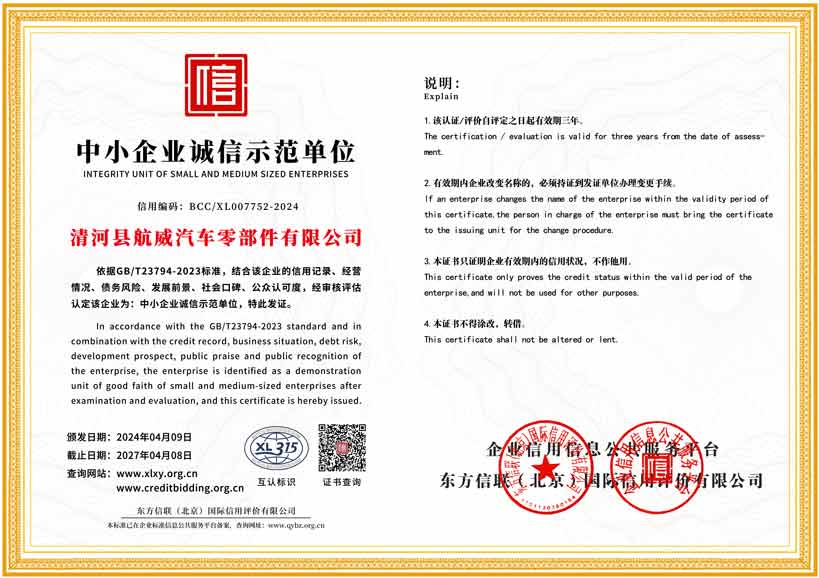Durable Stainless Steel Clutch Line for Enhanced Vehicle Performance and Reliability
The Importance of Stainless Steel Clutch Lines in Automotive Engineering
In the world of automotive engineering, even the smallest components play a crucial role in the efficiency and reliability of a vehicle. Among these components, the clutch line is essential for seamless vehicle operations, especially in manual transmissions. While traditional clutch lines made from rubber or other materials have served their purpose for years, the evolution of technology has led to the widespread adoption of stainless steel clutch lines. This article delves into the significance of stainless steel clutch lines, highlighting their benefits, applications, and impact on vehicle performance.
Understanding Clutch Lines
Clutch lines are hydraulic lines that transfer fluid from the master cylinder to the slave cylinder in a vehicle's clutch system. This process enables the driver to disengage and engage the clutch, allowing for smooth gear transitions. As automotive technology advances, the demands on these components have increased in terms of durability, resistance to heat and pressure, and overall performance.
The Advantages of Stainless Steel Clutch Lines
1. Durability and Longevity One of the standout features of stainless steel clutch lines is their durability. Stainless steel is resistant to corrosion, rust, and wear, making it an ideal material for automotive applications. Unlike rubber lines, which can deteriorate over time due to environmental exposure, stainless steel can withstand harsh conditions, increasing the lifespan of the clutch system.
2. Resistance to High Pressure Clutch systems operate under significant pressure, especially in high-performance vehicles. Stainless steel lines can handle this pressure more effectively than rubber counterparts, reducing the risk of leaks and failures. This is particularly important in performance vehicles where reliability is paramount.
3. Heat Resistance The transmission of power generates heat, and traditional rubber lines can struggle to maintain integrity under high temperatures. Stainless steel’s thermal stability ensures that the clutch line remains functional even when temperatures rise, helping to maintain optimal performance.
4. Consistent Performance Stainless steel clutch lines provide a consistent and reliable performance. The high rigidity of the material prevents expansion or flexing under pressure, ensuring that the hydraulic fluid flows smoothly without interruptions. This consistency translates to better clutch feel and control for the driver.
stainless clutch line

5. Aesthetic Appeal Beyond functionality, stainless steel clutch lines contribute to the aesthetic appeal of a vehicle's engine bay. Their polished finish gives a sleek and professional look, which can enhance the overall visual appeal of performance builds and custom vehicles.
Applications in Automotive Performance
Stainless steel clutch lines are particularly favored in motorsports and performance racing due to their robust characteristics. In environments where every millisecond counts, the reliability of clutch operation can be a determining factor in a vehicle's performance. Additionally, many modern performance cars and aftermarket tuning companies have shifted towards stainless steel lines as standard equipment, acknowledging the advantages they offer over traditional materials.
Installation and Maintenance
Installing stainless steel clutch lines is relatively straightforward, especially for those who are familiar with vehicle maintenance. Most aftermarket lines come with detailed instructions and all necessary fittings to simplify the process. It is important to ensure that the lines are fitted correctly to avoid issues with leaks or pressure loss.
Maintenance of stainless steel clutch lines is minimal compared to rubber options. Regular inspections can help identify any potential issues, but the robust nature of the material often means that once installed, they require little attention.
Conclusion
In conclusion, stainless steel clutch lines represent a significant advancement in automotive engineering. Their durability, resistance to pressure and heat, consistent performance, and aesthetic appeal make them an excellent choice for both performance vehicles and everyday drivers. As the automotive industry continues to evolve, the adoption of high-quality materials like stainless steel will undoubtedly play a pivotal role in enhancing the reliability and efficiency of vehicle systems. For car enthusiasts and professionals alike, investing in stainless steel clutch lines is a wise decision that will pay off in improved performance and longevity of the vehicle's clutch system.
-
Upgrade Your Control with Premium Throttle CablesNewsAug.08,2025
-
Stay in Control with Premium Hand Brake CablesNewsAug.08,2025
-
Experience Unmatched Performance with Our Clutch HosesNewsAug.08,2025
-
Ensure Safety and Reliability with Premium Handbrake CablesNewsAug.08,2025
-
Enhance Your Vehicle with High-Performance Clutch LinesNewsAug.08,2025
-
Elevate Your Ride with Premium Gear CablesNewsAug.08,2025
